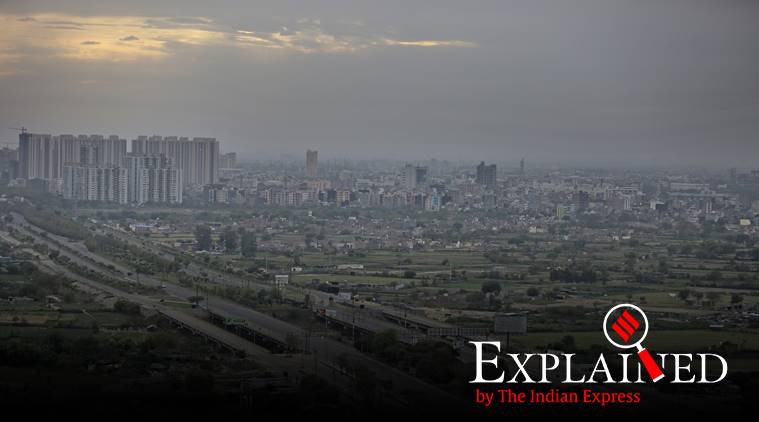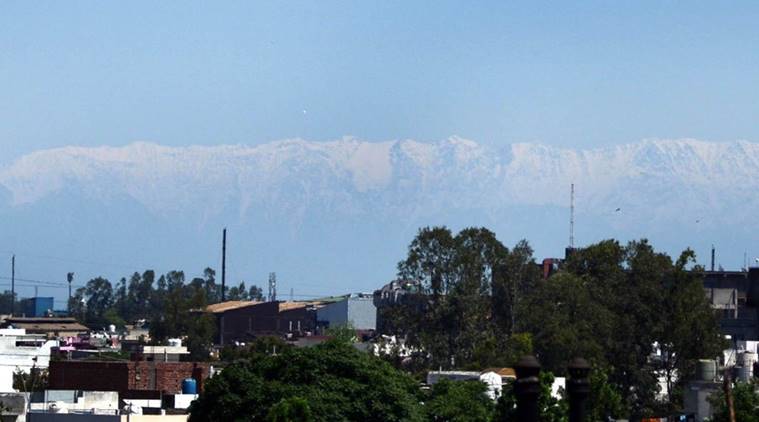- India
- International
Explained: How COVID-19 might complicate the conversation around climate change
While the air may be getting cleaner, the coronavirus lockdowns are not exactly good news for climate change research. Here's why
 Roads are seen deserted during a lockdown in Greater Noida. (AP Photo: Altaf Qadri)
Roads are seen deserted during a lockdown in Greater Noida. (AP Photo: Altaf Qadri)
Amidst the pandemic, one of the silver linings that has been reported from across the world is that people are breathing cleaner air and are witness to clearer, more blue skies as human movement has been restricted due to lockdowns imposed by various countries. At present, over half of the world’s population is under lockdown. Residents of Delhi, which is otherwise one of the most polluted cities in the world are breathing the cleanest air the city has seen during this time in over five years.
But while the air may be getting cleaner, the lockdowns are not exactly good news for climate change research, which is witnessing setbacks in the form of funding cuts, cancelled climate conferences and reduced political will to tackle climate change.
Further, experts warn that the change in AQIs is at best temporary and therefore may not be reason enough to rejoice. The MIT Technology Review has said that it would be a “mistake” to assume that the pandemic could “meaningfully reduce” the dangers of climate change.
How is the pandemic impacting climate change research?
One of the major concerns is that as climate change research has been halted, it might become difficult to restart the conversation around it, even after the pandemic is brought under control.
The Guardian reported that the major projects that were scheduled to gather environmental data have all been cancelled or postponed and the crisis has also cast a shadow on routine monitoring of weather and climate change. Further, because commercial flights are running at a lesser frequency, it has also become difficult to collect ambient temperatures and the wind speed, which is taken by in-flight sensors.

📢 Express Explained is now on Telegram. Click here to join our channel (@ieexplained) and stay updated with the latest
However, it is not climate change research alone that is suffering. An article in The New York Times points out that due to the pandemic, most other laboratory research has been put on hold. One reason for this is that researchers and medical scientists are required to focus their work on the “single topic”, which is coronavirus. The other reason that other research has more or less been halted is because of restrictions including lockdowns, insistence on working from home and other social distancing requirements.
 The Dhauladhar range in Himachal Pradesh is now visible from Jalandhar. (Express Photo: Anju Agnihotri Chaba)
The Dhauladhar range in Himachal Pradesh is now visible from Jalandhar. (Express Photo: Anju Agnihotri Chaba)
But since the COVID-19 crisis is more immediate, can’t climate change and the environment take a back seat for now?
Due to the looming health crisis, human kind’s immediate survival is the biggest concern at the moment, but while that is the need of the hour, completely ignoring environmental policy may not be in humanity’s best interest.
In an interview, Aaron Bernstein, the director of Harvard University’s Center for Climate, Health and the Global Environment said that the separation of health and environmental policy is a “dangerous delusion”.
Don’t miss from Explained | Economists comparing current crisis with Great Depression: What was it?
“Our health entirely depends on the climate and the other organisms we share the planet with. We need to bring these communities together. Some progress has been made in addressing the risk of pathogen spillover from animals into people. But largely we still view the environment, and life on earth, as separate. We can and must do better if we want to prevent the next infectious pandemic,” Bernstein said.
 Moored gondolas on an empty Grand Canal are seen in Venice, Italy, March 11, 2020. Fish and dolphins were reportedly seen in the city’s waterways following restrictions. (Reuters Photo: Manuel Silvestri)
Moored gondolas on an empty Grand Canal are seen in Venice, Italy, March 11, 2020. Fish and dolphins were reportedly seen in the city’s waterways following restrictions. (Reuters Photo: Manuel Silvestri)
Is there a link between climate change and infectious diseases?
The two are not directly related, which is to say that climate change did not lead to the spread of the coronavirus, but there is a possibility that climate change could have exacerbated the impact of COVID-19 by making the consequences worse for some humans. For instance, air pollution’s impact on human health could make some consequences of the disease more severe for a few humans. A 2003 study on air pollution and the case fatality rate for SARS showed that people exposed to air pollution were more likely to suffer severe consequences from the disease.
Further, the WHO says that there is an apparent increase in many infectious diseases including SARS, HIV-AIDS and hantavirus among others, which reflects the combined impacts of rapid demographic, environmental, social, technological and other changes in the way that humans live. As per WHO, climate change affects the occurrence of infectious diseases.
“Humans have known that climatic conditions affect epidemic diseases from long before the role of infectious agents was discovered, late in the nineteenth century. Roman aristocrats retreated to hill resorts each summer to avoid malaria. South Asians learnt early that, in high summer, strongly curried foods were less likely to cause diarrhoea,” WHO has said.
Some other examples of how environmental changes affect the occurrence of various infectious diseases include the building of dams and canals and irrigation carried out by humans, which led to the emergence of malaria and schistosomiasis (snail host habitat, human contact).
Here’s a quick Coronavirus guide from Express Explained to keep you updated: What can cause a COVID-19 patient to relapse after recovery? | COVID-19 lockdown has cleaned up the air, but this may not be good news. Here’s why | Can alternative medicine work against the coronavirus? | A five-minute test for COVID-19 has been readied, India may get it too | How India is building up defence during lockdown | Why only a fraction of those with coronavirus suffer acutely | How do healthcare workers protect themselves from getting infected? | What does it take to set up isolation wards?
More Explained
EXPRESS OPINION
May 08: Latest News
- 01
- 02
- 03
- 04
- 05











































